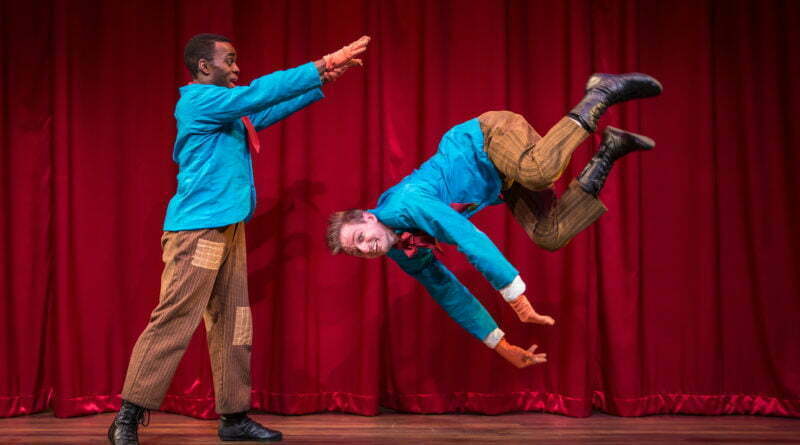Thaddeus and Slocum: A Vaudeville Adventure
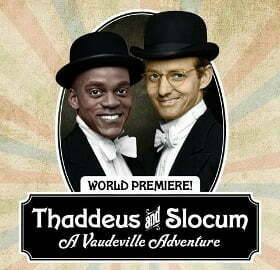
By Kevin Douglas
Directed by J. Nichole Brooks and Krissy Vanderwarker
Produced by Lookingglass Theatre Company
The Charm and Problems of Vaudeville Revisited
Representation of minorities is one of the most-discussed issues among actors and theatre artists today. Besides that actors of color complain of seldom finding interesting characters with significant stage/screen time to play, offensive practices and stereotypes which Chicagoans may have thought died out decades ago still exist and come up with surprising frequency. Thaddeus and Slocum: A Vaudeville Adventure’s writer, Kevin Douglas, and directors, J. Nicole Brooks and Krissy Vanderwarker, are believers in the Ghanian concept of sankofa, the idea that people have to return to the past to move forward. In a world-premiere drama featuring a plethora of signature Lookingglass acrobatics and early twentieth century vaudeville acts, Douglas and the cast explore the psychological impact of blackface on the white and black performers who used it, the politics of access, and the way racial disparity can taint even the closest relationships.
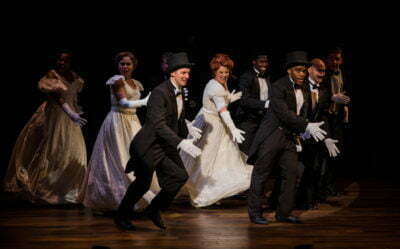
Thaddeus (Travis Turner) and Slocum (Samuel Taylor) are street-performers in 1908 Chicago. They dream of playing at the Majestic (now the PrivateBank Theatre used by Broadway in Chicago at 18 W Monroe), but in the meantime, perform hat-tricks, dances, and tumbling for disinterested passersby. Having been raised nearly as brothers by Slocum’s father, they’re as close as people can get, except for a few professional resentments. Slocum is childish and allows himself to be tempted by alcohol and gambling. Thaddeus is black. Since the Majestic only allows one “colored” act at a time, and the spot has already been filled, Slocum thinks that Thaddeus’s skin color is actually a bigger impediment to their success than his own behavior, not that he would ever dream of abandoning his brother (who basically takes care of him). Thaddeus isn’t so emotionally dependent on Slocum, though, and is already planning his own show when Slocum shows up drunk one night, his face smeared with cork, and bragging he’s had a brilliant idea. Why don’t they disguise Thaddeus’s race by both performing in blackface?
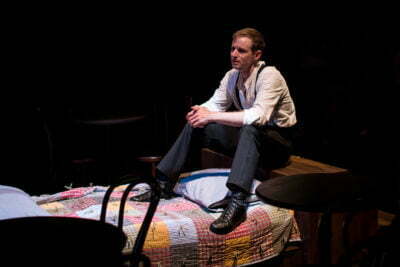
Thaddeus can think of several good reasons not to do this, but goes along with it for a test run, and they find it works. That is, it works as a disguise; Thaddeus hates doing it, and is disturbed by how much Slocum enjoys playing up the racist aspects of his minstrel character. But they get access to the Majestic’s performers, including the beautiful singer Isabella (Monica Raymund, Christina Nieves beginning July 20). Both men are smitten by her, but when he encounters her at a mixed-race venue in the red light district, Thaddeus realizes that she’s only been passing for white. There, he also meets Zeke (Tosin Morohunfola), an ambitious black performer who reassures him that whatever is necessary to get into the Majestic is morally justified, and Zeke’s dance partner, Nellie (Sharriese Hamilton), who vehemently disagrees and would rather African-Americans celebrate their own culture. More torn than ever, Thaddeus’s relationship with Slocum frays just as they’re on the brink of their big break.
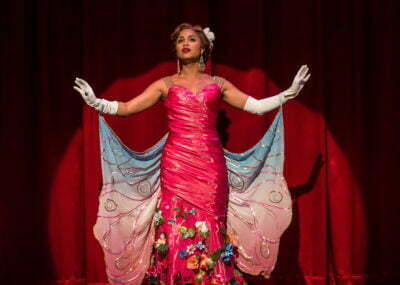
Being a vaudeville adventure, the show features several old-fashioned acts, some of which are intended to be ridiculously stupid. Scenic designer Collette Pollard has turned Lookingglass’s blackbox into a thrust stage with billowing red curtains, across which strides a dancing cow, a Spy vs. Spy-style dumbshow, and other evidence that, undisciplined and emotionally troubled though he is, Slocum actually may be among the better partners Thaddeus could hope for. Molly Brennan, as a burlesque matron, performs a “classy” strip-tease, and Lawrence E. Distasi demonstrates a few acrobatics high above the stage. But as Zeke and Nellie, Morohunfola and Hamilton perform a dance that is dignified, sexy, authentic to African-American culture, and an inspiration to Thaddeus. His and Slocum’s own routines are the main evidence that they actually care about each other, and provides the core of the show’s theatricality. Their tumbling requires close contact and trust, they move in synchronization, and prior to using cork, they display comfortable intimacy with each other. Indeed, though their minstrel show is dependent on racist portrayals, Douglas’s script calls for it to be performed in full twice, relying on it as both a plot device and to provide the energy of the play-outside-the-play.
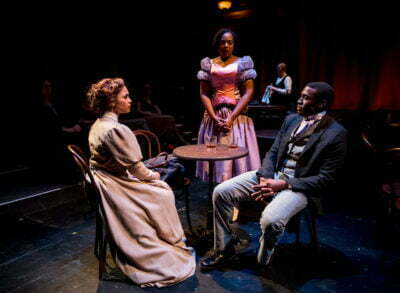
That Thaddeus and Slocum displays the dumbest and most cringe-worthy aspects of Vaudeville performance even as it relies on them to entertain its audience is, of course, its core point. Despite everything infuriating about the entertainment industry and its audience, Thaddeus and Isabella desire more than anything to be fully included and accepted as reformers, not wreckers. It’s a remarkable tribute to the power of this kind of amusement, as well as the pacing by the directors, that the show feels short despite its meandering nature. Douglas included several characters who have no clear relevance to the story except that they establish a sense of an artistic community, which, even divided, is made up of people who share their weird passions.
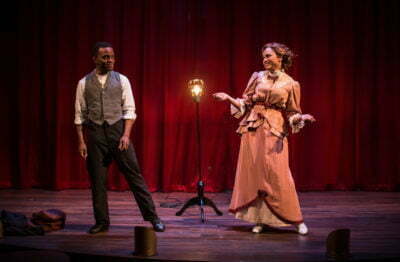
Turner and Taylor also deserve credit for performing with skill to match their heart—the hat tricks and slapstick they pull off must be extremely difficult. Katie Spelman and Sylvia Hernandez-Distasi provided them with complex choreography which they and the other actors do with aplomb. Audiences are left to wistfully wonder, had he been afforded the proper respect and been allowed to make the necessary changes, Thaddeus could have redeemed his routine and relationship with Slocum, instead of being relegated to his own world with the other African-American artists to devise material that was worthy of them. Lookingglass’s new play makes a strong case for why inclusiveness is vital to the arts, and does so through a masterful piece of tragic storytelling.
Highly Recommended
Jacob Davis
Reviewed June 11, 2016
This show has been Jeff recommended.
For more information, see Thaddeus and Slocum’s page on Theatre in Chicago.
Playing in Water Tower Water Works, 821 N Michigan Ave, Chicago. Tickets are $40-75, with cabaret pit seats available for $20 to patrons under 35 years old. to order, call 312-337-0665 or visit lookingglasstheatre.org. Performances are Wednesdays-Sundays through August 14. Running time is two hours and fifteen minutes with one intermission. Thaddeus and Slocum contains adult language and mature themes relating to the racial inequalities in 1908 Chicago. Recommended for ages 13 and up with parental discretion.

